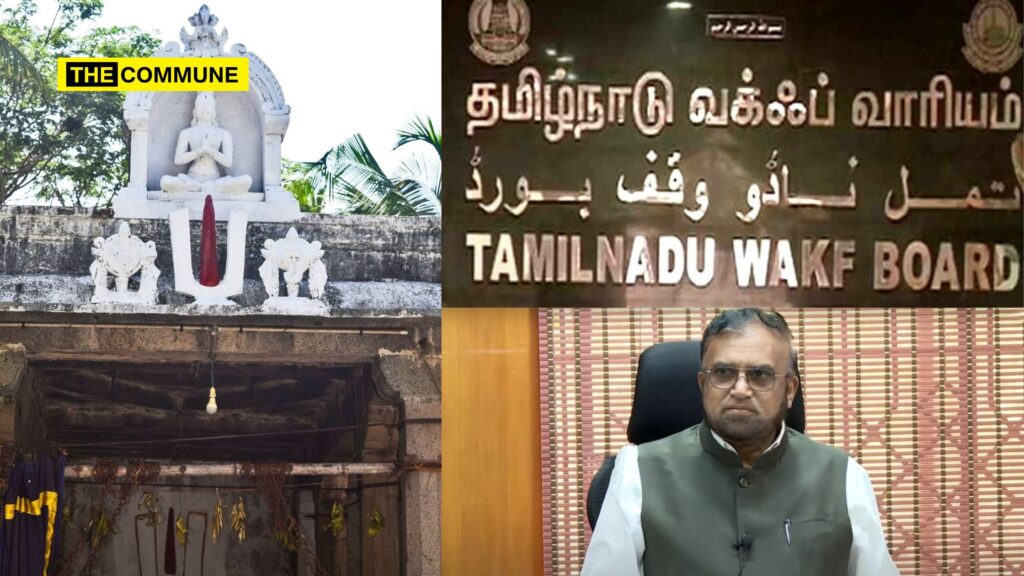Tamil Nadu Waqf Board President Abdul Rahman announced that many Hindu temples are present on Waqf properties, including the Peyazhwar Temple, on land allegedly owned by the Kutchery Road Mosque. Rahman said the board never disputed their existence or interfered with its operations even then.
Rahman also claimed that some individuals are attempting to politicize Hindu temples located on Waqf board properties.
During a recent press conference in Nagapattinam, he explained that during the British era, the Waqf Board was established to manage lands voluntarily donated by wealthy individuals to maintain dargahs and mosques. He emphasized that the “Waqf Board has never opposed Hindu temples situated on Waqf properties” and views such temples as a pride.
Rahman accused certain parties of trying to create discord between religious communities by politicizing these Hindu temples. At the same time, the Board’s primary concern remains addressing any attempts to expropriate these properties illegally.
At a press conference on 11 August 2024, Abdul Rahman clarified the status of Tiruchendurai village. He explained that a wealthy Mirasdar had donated 385 acres of land for public use, officially registered with the Waqf Board. He said this is documented and recorded with the Tamil Nadu Waqf Board. Based on these documents, including survey numbers and other data, orders were issued to all sub-registrar offices to prevent the sale of these lands without permission, including orders on Tiruchendurai.
Rahman noted that Tiruchendurai has since expanded to over 600 acres. The Waqf Board’s authority is limited to reclaiming land it owns, and any suggestion that the Waqf Board is seeking to claim the entire village is misleading and creates unnecessary panic among the public. He emphasized that the Waqf Board has not made such claims.
Addressing the allegations regarding the Waqf Board’s claims on 1,000-year-old temples, Abdul Rahman clarified, “A 1000-year-old temple is pointed out in the particular area, and the temple is not an issue as the Tamil Nadu Waqf Board has never said anything about it. The Waqf does not even claim the presence of a temple on Waqf property.”
Rahman provided an example from Sooriyur, a vast village in the Trichy district that is one of seven villages under Waqf management. He said that “eight to nine lakes surround a 1000-year-old temple. The documents state that the temple and these surrounding lakes belong to the Hindus for their worship and should continue. Therefore, we are not disputing it.”
Continuing his response to claims regarding Hindu temples, Abdul Rahman provided another example from Chennai. He mentioned that the Kutchery Road Mosque, which owns 144 grounds, includes a 4-ground piece of land on which the Peyazhwar temple is situated. He questioned whether the Waqf Board has ever claimed this land.
Abdul Rahman said, “Chennai’s Kutchery Road Mosque owns 144 acres of land, among which four grounds contain a temple called Peyazhwar Temple or something like that. It is on waqf property. Have we ever talked about it? The Hindus worship there, so we are keeping it as it is.”
Rahman emphasized that the lands donated by wealthy individuals were meant for public benefit and should be viewed from a religiously neutral perspective. Ironically, he further argued that while the temple belongs to Hindus, the land is under the Waqf Board’s jurisdiction, which has a duty to protect these lands. He noted that the Waqf Act underscores the importance of safeguarding such properties.
Finally, Abdul Rahman buttressed his claim with a thought-provoking explanation regarding the claim on the 1,000-year-old temple. He illustrated his point with a hypothetical scenario. If he were to purchase a piece of land that contains a Vinayagar temple and allowed the worshippers to continue their practices there, it would be unreasonable for those worshippers to then claim the temple as their own based on its 600-year history after the purchase. Rahman used this analogy to emphasize that, likewise, the Waqf Board manages lands and properties of villages like Tiruchendurai and others, including temples. However, he did not address how these ancient properties came under Waqf’s control.
Who was Peyazhwar?
Pey Azhvar, one of the twelve Alvar saints, is a key figure in the Vaishnava tradition of Hinduism in Southern India. Ranked third among the principal Azhvars, he is renowned for composing a hundred verses, known as Munram Tiruvantati. According to legend, Pey Azhvar was discovered at the Adi Kesava Perumal Temple in Mylapore, Chennai.
In Tamil, pey refers to someone who is possessed. The saint was intensely devoted to Lord Vishnu.
Subscribe to our Telegram, WhatsApp, and Instagram channels and get the best stories of the day delivered to you personally.

